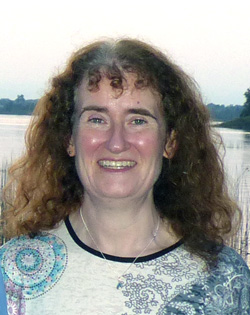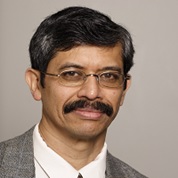Keynote, 13 September '23: Cycles of Development and Artificial Intelligence in Systems of Survival
Biography
Sajda Qureshi is Kayser Chair Professor at the Information Systems Department and Director of the Information Technology for Development mHealth Lab at the College of Information Science and Technology at the University of Nebraska at Omaha. She serves as Editor-in-Chief of the Journal of Information Technology for Development. She received her PhD at the London School of Economics. She was President of the AIS International Special Interest Group for Global Development (GlobDev). She co-chairs the Annual SIGGlobal Development workshop at ICIS, and has supported the SIGGlobDev workshops at ECIS, and AMCIS mini-tracks at Track chair and other leadership roles. She was coordinator of the Commonwealth Network of Information Technology for Development at the Commonwealth Secretariat in London, was Assistant Professor at Erasmus University Rotterdam in the Netherlands, and has been numerous awarded funded research projects.
Prof. Qureshi has over 200 publications in conferences, books and journals such as IEEE Transactions in Professional Communication, Group Decision and Negotiation, Information Infrastructure and Policy and Communications of the ACM, books published by Prentice Hall, Springer-Verlag, Chapman and Hall and North-Holland.
Prof. Qureshi has secured around 1.1 million dollars in grants and contracts and has been awarded the Outstanding Graduate Mentor Award, at the University of Nebraska Omaha (UNO) (2014), the UNO Faculty Service Learning Award (2011) and the Association for Computing Machinery (ACM), Recognition of Service Award (2003).
Keynote, 13 September '23: The Role of Engineering and Technological Innovation in Addressing Societal Challenges
Biography
Miriam Cunningham (IEEE Senior Member, IEEE-HKN) is a technology and innovation expert with over 25 years experience working with education and research, industry and government organisations in Europe and Africa. Miriam specialises in contributing to policy analysis, research capacity building, adaptation and implementation of appropriate technology in low resource environments.
Miriam is actively involved in supporting ICT4Development / Humanitarian Technology related activities and conferences. Miriam has extensive experience as Co-Principal Investigator of large-scale digital technology innovation oriented cross-border and regional projects in Europe and Africa. She has co-organised over 45 large international conferences around the world, including both IEEE and government hosted conferences.
Miriam is also Head of Research of the not-for-profit IST-Africa Institute, working in strategic partnership with Ministries and National Councils responsible for Innovation, Science and Technology in 18 African Member States.
Miriam is an active IEEE volunteer, currently serving as a Member of the Society on Social Implications of Technology (SSIT) Board of Governors (2020 - 2022, 2023 - 2025), IEEE Humanitarian Technology Board (2023), IEEE Region 8 Humanitarian Activities Committee (2022 - present), and Chair, IEEE UK and Ireland SSIT Chapter.
Keynote, 14 September '23: Mobile Payment App Use for Digital Financial Inclusion: Affordances, Constraints, and Cross-country Cultural Influences
Biography
Dr. H.R. Rao was named the AT&T Distinguished Chair in Infrastructure Assurance and Security at The University of Texas at San Antonio College of Business in January 2016. He also holds a courtesy appointment as full professor in the UTSA Department of Computer Science. Prior to working at UTSA, Professor Rao was the SUNY Distinguished Service Professor at the University at Buffalo. He graduated from Krannert Graduate School of Management at Purdue University. His interests are in the areas of management information systems, decision support systems, e-business, emergency response management systems and information assurance. He has chaired sessions at international conferences and presented numerous papers. He also has co-edited four books, including Information Assurance Security and Privacy Services and Information Assurance in Financial Services. He has authored or co-authored more than 200 technical papers, of which more than 125 are published in archival journals.
Professor Rao was the inaugural recipient of The Bright Internet Award for his contributions to the information systems discipline by KMIS, the Korea Society of Management Information Systems. In 2018 Professor Rao was awarded the International Federation for Information Processing (IFIP) Outstanding Service Award for significant service contributions to the field of information systems and information systems security. In November 2016, Professor Rao received the prestigious Information Systems Society Distinguished Fellow Award (Class of 2016) for outstanding intellectual contributions to the information systems discipline. Rao’s work has received best paper and best paper runner up awards at ISR, AMCIS and ICIS.
He has received funding for his research from the National Science Foundation, the Department of Defense and the Canadian Embassy. He also received the Fulbright fellowship in 2004. Rao is a past chair of IFIP WG 8.11/11.13, the working group for Information Systems Security Research. He is co-editor in chief of Information Systems Frontiers, advisory editor of Decision Support Systems, associate editor of ACM TMIS and senior editor (emeritus) at MIS Quarterly.
Keynote, 15 September '23: Navigating Tensions Between Indigenous Communities and Global Development Partners: Reflections on 25 Years of Fieldwork in East Africa
Biography
Mr. Badhrus works as a Programme Manager at MEWA, a non-governmental organization that was established in 1994 with the aim to contribute towards the provision and promotion of best practices in education, research, healthcare. Since then, MEWA has expanded its services to the public that include a hospital, library, education scholarships, ICT training programmes, residential drug treatment and detox services, and a range of initiatives for the creation of a healthy, socio-cultural and economic enriched society.
He has over 25 years of field experience in the design and delivery of drug prevention, addiction treatment, and harm reduction in Kenya, Tanzania, Zanzibar, and Lamu island. He is co-founder of MEWA Drug Treatment Centre (2001), founder of MEWA Detoxification Unit (2006) and the MEWA Drop-in Centre (2008). In 2009, he co-founded the Drug Free Zanzibar organization that coordinates and manages drug treatment centres in Zanzibar. His work has been funded by national and international funding agencies including the United Nations Office on Drugs and Crime (UNODC), USAID, Irish Aid, as well as donations from public and private sector organizations (e.g., Mombasa Lions Club) in Kenya and overseas.
He has been invited to present his work to national and international audiences in Ireland, South Africa, Senegal, Ethiopia, Malaysia, and Pakistan, Portugal, and Canada.
He is a highly respected community activist who strives to educate individuals, families, educators, policymakers, business and religious leaders, and service providers about the complex, socially embedded nature of drug and substance, and its impact on the wider community by promoting access to health and social justice. He is an active volunteer in organizing rallies for commemorating the annual United Nations Against Drug Abuse and Illicit Trafficking Day in Mombasa, Kenya. An event that attracts 1000s of participants, and dignitaries from East Africa, and is featured on national television and newspapers.
He received his professional training as a counsellor with the Kenya Counselling and Psychological Association (KAPC) and has received a wide range of specialized training in the treatment and rehabilitation of drug abusers by the United Nations Office on Drugs and Crime (UNODC), as well as in-house training at Tabor Lodge Treatment Centre, Ireland.






